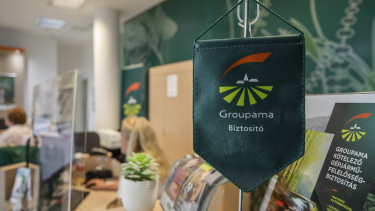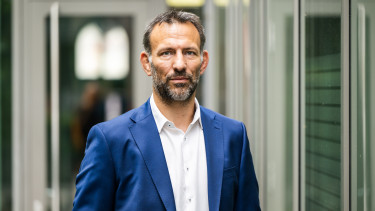Hungarian fintech ventures into consulting business

Bálint Fischer, innovation chief at Dorsum, told Portfolio in an interview that the company has been consultancy services for years. Even three to four years ago Dorsum regularly participated in relation to its IT projects in the preparation of conceptual materials, conducted business analyses, analysed market conditions jointly with the client and set up various business cases together.
Dorsum run in consultancy tenders on its own in 2019 and it was ready to start building its consulting business unit with a dedicated team of experts.
In response to the epidemiological situation we have accelerated market entry and officially launched the consulting business in mid-May
, said Fischer. He noted that the team has recently been expanded by an expert with years of experience in consulting.
Bálint Kummer, Head of Clavis Product Management at Dorsum, said it was a big step forward for the company to set up two businesses operating side by side and comprising mainly associates engaged in business activities. The innovation business is led by Fischer, while Kummer is the head of the team focusing on the renewal of the company’s back-office systems.

Asked about the practical side of consulting in IT, Fisher said customers typically seek assistance in areas they want to function better but lack the necessary in-house resources and know-how for.
Being present at over 80 financial institutions in the region Dorsum can help not only with IT solutions, but also with business proposals, as over the last 20 years it has accumulated a wealth of knowledge in the investment and asset management markets, as well as in premium and private banking services, added Fischer.
Dorsum has a way to translate strategic-level challenges to layman’s terms and come up with tangible solutions, he said. Even in consulting it applies the tight project planning that stems from the IT way of thinking, and advances in one or two-week “bursts”, in close co-operation with the client.
In more complex projects the company involves all competences, e.g. technology and business architects, UX designers, investment lawyers and experts in digital transformation or process automation.
It’s important that we deal in depth with a specific area of the financial and fintech world, and that is wealth management, investment and the premium and private banking segment. This is a niche area, but our practical knowledge here is so deep that we are in a unique position not only in Hungary but also in the entire region.
“We’re in the swim of the latest technologies, business challenges, international trends and we see on a practical level how corporations operate, we know their business processes and the related legal environment in the whole region. This is the main reason why more and more companies work with us instead of well-established large partners.”
Kummer noted that even before they had a lot of competencies by which they bettered work processes and helped lower costs, and the idea to carry on such activities in a separate consulting business hailed from there.
When asked about the weight of the consulting business in total income, Fischer replied that after a recent start the weight is not decisive but they do expect dynamic growth. He added that the sheer existence of this business is a huge value for clients, and Dorsum does not aim to have each of its customers use Dorsum’s software solutions.
Kummer added that unlike a lot of the mammoth global consulting firms Dorsum does not exclude itself from the project once the required documentation is handed over.
We can help them with the implementation and are more sensitive to the customers’ problems.
He added that Dorsum can “translate” technical problems into the language of business and conversely, acting as some kind of a moderator, e.g. between the different segments of a particular financial institution.

The coronavirus pandemic brought immense changes in operations. After the outbreak Dorsum also “hibernated” for a few weeks and went back to the drawing board, trying to find out how switching to working from home was taken by the customers, said Fischer.
He added that a lot of ideas that had been in the forefront at corporations four or five months ago have been pushed back on the list of priorities.
It is only natural that in this kind of economic environment it becomes more cumbersome even for large banks to take decisions on large-volume multi-year development projects.
"In exchange, however, there is a lot greater openness to smaller-scale projects, e.g. consulting or easily implementable solutions that help enhance digital user experience,” he added.
This brought about a very rapid change in the way of thinking also at Dorsum, for it typically works on large projects with large financial institutions.
Consultations with potential customers have been focused on ways to make the opening of security accounts easier and smoother and to add to the user experience when it comes to digital communication between private bankers and their customers. The need to provide clients with more comprehensive and easily processable information about savings via smart phones also comes up often.
Fischer said that while these new subjects and ideas might not make up for revenues lost due to the delay of other projects, they may be the springboard to a new type of internal “construction” they have been mulling for years.
I firmly believe that those companies will emerge from this crisis victorious that can change and adapt even in matters that affect their fundamental business model.
These kind of businesses will see the new opportunities despite the short-term negative effects and are also willing to invest in these. This is exactly our mind-set, he added.
When asked about completely paper-free document management and processes, Kummer said Dorsum had a lot of discussions on this matter also with the National Bank of Hungary (MNB), and the central bank’s approach was very positive.
He stressed that in day-to-day operations the use of paper or even personal physical contact would not be required at all. Solutions can be found on every front to make processes completely free of these.
The coronavirus pandemic forced a change in the mind-set also on the customer side. There was simply no alternative. When you have no choice but to work from home and you don't have a printer, you obviously cannot hand your colleague a signed document and he cannot mail it to the client.
The legislative restrictions still in place could be lifted, but you also need companies for a real digital transformation, Kummer concluded.

The publication of this article was sponsored by Dorsum.














